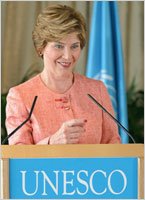honorary ambassador for the
United Nations Literacy Decade,
will host the Conference.
Photo: State Department(© AP Images)

The White House Conference on Global Literacy is to take place in New York City on September 18, 2006. Invitations to the literacy conference targeted first ladies, first spouses and ministers of education from countries with large populations or high illiteracy rates. According to U.S. officials, to date, roughly 25 first ladies and 40 ministers of education have responded that they will attend.
Officials from the White House and the U.S. State Department met yesterday with staff members from embassies around the world to discuss the upcoming White House Conference. At the informal briefing, Anita McBride, chief of staff to first lady Laura Bush, welcomed the officials and told them the first lady takes her role of honorary ambassador for the United Nations Literacy Decade “very, very seriously” and wants to make a contribution by hosting a major event to highlight successful literacy programs from around the world.
The conference will be delivered in seven languages and will include a luncheon at which attendees can share their reactions and ideas. It will include three panels that will present nine literacy programs from nine countries. The first panel will cover mother-child literacy and intergenerational learning and will be moderated by U.S. Department of Education Secretary Margaret Spellings. The second will discuss the positive effects literacy has on health and will be moderated by Randall Tobias, director of foreign assistance and administrator of the U.S. Agency for International Development. The third will discuss the role literacy plays in achieving economic self-sufficiency and will be moderated by Gerri Elliott, vice-president of Microsoft Corporation. Click here to download a PDF document containing a factsheet on the conference.
UNESCO reports that "the Conference will enlist the participation of the Director-General of UNESCO, Koïchiro Matsuura. UNESCO, as the lead agency for the Literacy Decade, will also provide technical assistance in identifying good literacy practices as well as the key characteristics of effective literacy programs." UNESCO is a consponsor of the Conference with various U.S. government agencies.
Mrs. Bush announced the Conference at an event in April that coincided with the annual celebration of UNESCO's Education for All (EFA) Week. Her remarks on that occassion are worthy of your attention, as the following excerpt demonstrates:
Training more teachers is vital to UNESCO's goal of making sure every child has access to a basic, quality education by 2015. This is important for every country, but especially for developing countries, where limited resources often mean that the neediest children are not educated. We have to make sure that all children -- boys and girls, rich and poor -- have access to a good education.
One of the best ways we can improve educational opportunities for all is by spreading literacy. And one of the most important reasons every child should have a teacher is so that every child can learn to read.
There's no such thing as a quality, basic education for a person who cannot read or write. Reading is the bedrock on which the entire mind is built -- one book, one essay, one instruction manual at a time. And reading doesn't just allow people to enjoy literary treasures. It allows them to become entrepreneurs, or engineers, or lawmakers, or doctors. In villages around the world, mothers who read can then teach their children how to read. Literate mothers can also participate in their economies, and they can earn a living for themselves and their families. So widespread literacy isn't a luxury for healthy societies -- it's a basic requirement.
Across the globe, more than 800 million people are illiterate. Eighty-five percent of them live in just 34 countries, concentrated in regions affected by poverty. And more than two-thirds of the 771 million adults who cannot read a simple book, or write a basic sentence, are women.
I've visited many countries around the world, and I've seen how efforts to expand literacy are improving lives, especially for women and girls.
Literacy Day

It is especially fitting that we are able to announce this meeting now, since tomorrow, September 8, has been designated by the United Nations as Literacy Day! The United Nations reports:
Literacy is a cause for celebration since there are now close to four billion literate people in the world. However, literacy for all – children, youth and adults - is still an unaccomplished goal and an ever moving target. A combination of ambitious goals, insufficient and parallel efforts, inadequate resources and strategies, and continued underestimation of the magnitude and complexity of the task accounts for this unmet goal. Lessons learnt over recent decades show that meeting the goal of universal literacy calls not only for more effective efforts but also for renewed political will and for doing things differently at all levels - locally, nationally and internationally.
The Literacy Day website has a large number of useful Internet links for those interested in the promotion of literacy. UNESCO also has created a website relating the organization's Literacy Day activities.